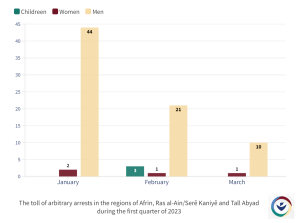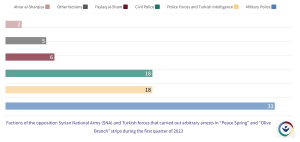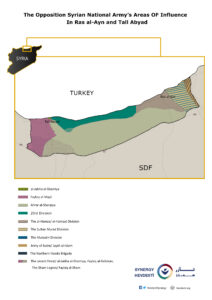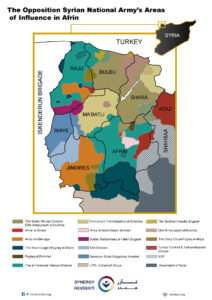Introduction:
Arrests and arbitrary detention committed by Turkish forces and Turkish-backed factions of the opposition Syrian National Army (SNA) continue to take place in the regions of Afrin, Ras al-Ayn/Serê Kaniyê and Tall Abyad, which are occupied by Turkey as a result of “Olive Branch” Operation in 2018 and “Peace Spring” Operation in 2019.
During the first quarter of 2023, Synergy Association for Victims documented the arrest of at least 82 persons, including four women and three children, in Afrin, Ras al-Ayn/Serê Kaniyê and Tall Abyad at the hands of Turkish forces and Turkish-backed SNA’s factions.
In the first three months of 2023, 63 persons, among them four women and three children, were arrested in Afrin, while 19 persons were arbitrarily detained in the areas of Ras al-Ayn/Serê Kaniyê and Tall Abyad. Only 15 out of the total toll of arrestees were released, including two women and one child. The fate of the remaining 67, among them two women and two children, remains unknown.
 The majority of detention and deprivation of liberty cases in areas of Afrin, Ras al-Ayn/Serê Kaniyê and Tall Abyad took place with a view to extort the victims and their families, or to get financial ransoms from them. Others were detained for the purpose of intimidating them and driving them to leave the region.
The majority of detention and deprivation of liberty cases in areas of Afrin, Ras al-Ayn/Serê Kaniyê and Tall Abyad took place with a view to extort the victims and their families, or to get financial ransoms from them. Others were detained for the purpose of intimidating them and driving them to leave the region.
The statements collected by Synergy showed that Turkish officials were present regularly in SNA-run detention facilities, and former detainees stated that the Turkish officials were also present during interrogation sessions, in which torture was used.
The detainees, mostly Kurds, were interrogated routinely about their alleged connection with the Autonomous Administration and/or the Syrian Democratic Forces (SDF). They were denied the right to retain a defense attorney and were released only after paying sums of money to members of the SNA’s factions.
The released persons, whom Synergy interviewed, narrated that they were continuously subjected to ill-treatment and torture. They were also blindfolded during interrogation sessions in the opposition SNA-run prisons in areas of Afrin, Ras al-Ayn/Serê Kaniyê and Tall Abyad.
In most of the cases documented by Synergy, the civilians were held either in the Military Police-run prisons based in Afrin, Ras al-Ayn/Serê Kaniyê and Tall Abyad, or in Hawar Kilis prison which is run by the Sultan Murad Division, or in Sijin al-Ma’sara (al-Ma’sara prison) based in A’zaz in the northern countryside of Aleppo, or in prisons run by the specific factions that arrested them. Some others were kept in anonymous detention places.
The victims consistently described poor detention conditions, including overcrowding, limited access to food and water, and deprivation of medical care. The SNA’s factions also deliberately concealed a large number of the detainees, and when the detainees’ families contacted the factions to ask about the whereabout of their loved ones, they were often given no information, or were threatened and extorted.
Detention has multi-faceted impacts on men, women and children containing physical and mental harm. Most of the former detainees described suffering from chronic physical pain resulting from brutal torture they sustained in prisons and unhealthy conditions they experienced inside detention facilities. Let alone suffering headaches and post-traumatic stress disorder.
Hundreds of families of those forcibly disappeared by the SNA in Afrin, Ras al-Ayn/Serê Kaniyê and Tall Abyad are still suffering a general feeling of anguish, hardship, and confusion as protection was not provided to them, and they were left to manage their affairs alone. Many families have tirelessly worked to obtain information about their missing ones, but to no avail.
Synergy relied in its documentation process on the information collected in its database provided by a network of field researchers, and on information they obtained from the detainees’ families and eyewitnesses. Furthermore, it verified the information from publicly available sources (open sources).
Synergy notes that the violations committed by Turkey and the SNA-affiliated factions in Afrin, Ras al-Ayn/Serê Kaniyê and Tall Abyad regions are far more than what have been documented and verified by name, surname, date and place of arrest; The Association believes that the actual number of arrest cases is significantly higher than the figure given in this report.
In a previous report published on January 9, 2023, Synergy documented the arrest of at least 633 persons, including 40 women and 21 children, in Afrin region during 2022. Three of the detainees died under severe torture in the SNA-run custodies.
Furthermore, Synergy documented in another report published on February 1, 2023, the arrest of at least 228 persons, including 11 women and 15 children, at the hands of Turkish forces and the Turkish-backed SNA-affiliated factions in the areas of Ras al-Ayn/Serê Kaniyê and Tall Abyad during 2022.
Arbitrary Arrest as A Systematic Policy:
In its latest report published on February 7, 2023, the Independent International Commission of Inquiry on the Syrian Arab Republic confirmed that SNA brigades in Afrin and Ras al-Ayn/Serê Kaniyê continue to conduct arrest and detention cases. The interviewees by the Commission consistently narrated being subjected to beating, torture and ill-treatment in several detention facilities and in some cases, they were beaten and tortured during interrogation sessions in the presence of Turkish officials. The Commission also documented cases of rape and other forms of sexual violence committed by members of the SNA brigades against the detainees, including against children. Let alone the confiscation of properties and prevention of civilians from getting access to them with threats of arrest if they dared to claim their properties.
The native people in the Turkish occupied territories of Afrin, Ras al-Ayn/Serê Kaniyê and Tall Abyad experience countless of violations on a daily basis, preventing the return of thousands of the internally displaced (IDPs) to their homes and claiming their seized properties.
Arbitrary arrest and detention, as well as other practices such as systematic confiscation of the victims’ properties, extortion, beating, killing in detention have become widespread in areas in Afrin, Ras al-Ayn/Serê Kaniyê and Tall Abyad.
The pervasive violations Turkish forces and the opposition SNA commit in areas of Afrin, Ras al-Ayn/Serê Kaniyê and Tall Abyad are often characterized with a racist and discriminatory background, particularly against the Kurds. While other violations, such as arbitrary arrest, enforced disappearance and property seizure among others are perpetuated on the motives of making money. No distinction was made among the victims on the basis of affiliation, religion, national or ethnic origin as the victims were from different components of the region between Arabs, Kurds, Muslims, Yezidis, Christians, Armenians, Syriac, and Chechens.
Families of the majority of arbitrary arrests’ victims were extorted by the SNA’s affiliated factions, and they were eventually forced to pay financial ransoms for the release of their loved ones, confirming that the practice was systematic, aiming at displacing the indigenous people, notably the Kurds, and seize their properties.
Legal Liability:
The SNA violated the detainees’ rights in accordance with international legal obligations. Various SNA’s factions have arbitrarily arrested and detained individuals and practiced cruel, inhumane and degrading treatment towards the detainees and the forcibly disappeared, as well as their families in various ways. One way is the deliberate concealment of the fate and whereabouts of the detainees and the disappeared persons in violation to the International Humanitarian Law (IHL) and Fundamental Principles of Human Rights[1]. Furthermore, the effective removal of these people from the protection of the law, if protection is found originally, and the failure to establish their fate constitutes a violation to the right to life[2].
In light of the continuous documented use of torture against detainees and the failure of the factions’ commanders as well as leaders of the Syrian Interim Government (SIG)/the opposition Syrian National Council (SNC) to take effective steps to prevent such practices, there are reasonable grounds to believe that the SNA may be practicing such conduct in pursuance of an organizational policy. Therefore, such conduct may be part of a systematic attack against the detainees in its custody, amounting to a crime against humanity; the crime of torture.
The SNA conducted no investigations in its forces’ practices, which continue to arrest civilians, ensuing them forcibly disappeared persons and violating their rights, nor did the Turkish government that has effective command and control on these forces to change their arbitrary conduct. On the contrary, it appears in some cases that the Turkish government was involved as a partner in committing such violations.
Therefore, the Turkish military commanders are held criminally responsible for violations committed by these parties [the SNA forces] in instances where the Turkish leaders knew or should have known about such crimes or failed to take all necessary and reasonable measures to prevent their commission.[3]
As an occupying power, Turkish authorities must ensure that their own officials and those under their command in the SNA do not arbitrarily detain or mistreat anyone. The Turkish authorities are also obliged to investigate alleged violations and ensure that those responsible are appropriately punished.
Toll of Arrests:
Synergy documented the arbitrary arrest of 63 persons, including four women and three children, in Afrin and its countryside during the first quarter of 2023 at the hands of Turkish forces and the Turkish-backed SNA’s factions. 13 out of the total toll of the arrestees were released while the fate of the others remains unknown.
The majority of arbitrary arrests was felt in January in which 33 persons, among them two women, were arrested. Followed by March, in which 23 arrest cases arose, including three children and one woman, were documented. The least cases of arrests occurred in February in which only six persons, among them a woman, were arrested.
The factions behind the arrest cases documented in Afrin region and its countryside are cited as follows: the Police Forces and Turkish Intelligence were responsible for 18 arrest cases, the Civil Police (affiliated with the SNA) 17 cases, the Military Police 16 cases, the Sham Legion/Faylaq al-Sham six cases, and other factions including Ahrar al-Sharqiya/Free Men of the East, Jaysh al-Sharqiya, Suleiman Shah Brigade/also known as al-Amshat six cases.
In the areas of Ras al-Ayn/Serê Kaniyê and Tall Abyad, occupied by Turkey since October 2019 due to “Peace Spring” Operation, Synergy documented the arbitrary arrest of 19 persons at the hands of the Turkish-backed SNA’s factions, during the first quarter of 2023.
The Military Police of the SNA was responsible for the arrest of at least 17 persons, the Civil Police and Ahrar al-Sharqiya each conducted one case of arrest. Only two persons out of the total toll of arrestees have been released while the fate of the rest 17 is uncounted for.

-
A Frequent Pretext:
Since the Turkish occupation of Afrin, Ras al-Ayn/Serê Kaniyê and Tall Abyad regions in 2018 and 2019, thousands of the native people, notably the Kurds, have been subjected to arbitrary arrest and enforced disappearance on alleged ties with the Autonomous Administrations and/or the SDF. Such pretext has become frequent to arrest civilians and extort their families.
In mid-March 2023, forces of the Military Police, affiliated with the SNA, arrested a young man in Ras al-Ayn/Serê Kaniyê. One of his relatives narrated to Synergy details of the arrest, saying:
“The guy was arrested inside his shop located in the center of the city’s public market. He was taken to the Military Police headquarter, where he was charged of alleged dealing with the Autonomous Administration. We have never heard about him since then. They have not allowed his family to see him, nor has he been presented before the court like dozens of others who were arrested for the same alleged charges.”
Another witness spoke to Synergy about another arrest that occurred at the hands of the Military Police, in Mid-March in the countryside of Ras al-Ayn/Serê Kaniyê:
“Forces of the Military Police stormed the house of a young man I know. They blindfolded, handcuffed him and arrested him on charges of dealing with the SDF. During detention, members of the Military Police beat him on his back and head with the Kalashnikov rifle right in front of his wife and children. We have not heard of him since then despite his family visited the Military Police headquarter based in Ras al-Ayn/Serê Kaniyê several times to uncover his fate, but to no avail.”
 In Afrin, an activist who works to document human rights violations told Synergy:
In Afrin, an activist who works to document human rights violations told Synergy:
“Since the occupation of Afrin, the remaining Kurdish population in the city has been repeatedly arrested on the pretext of previous alleged links with the Autonomous Administration or working with one of its civil or military institutions. But the main purpose behind the arrest is to intimidate them and push them to leave the area. Thus, seize their property and extort the detainees’ families to get ransoms.”

-
The Earthquake-Victims Are Arrested:
On February 11, 2023, Muhammed Abd, an alias, along with one of his friends were arrested in Afrin city while they were checking Abd’s damaged house due to the earthquake that struck northern Syria on February 6.
Abd, 50, narrated details of the arrest saying:
“My friend and I were standing in front of my house in Afrin, waiting for one of the engineers’ room staff in the city’s local council to check my earthquake-affected house. The engineer came and we [the engineer and I] entered the house but when I got out, my friend was not there. I looked for him for a little while and then a member of the Civil Police came and told me to accompany him to their headquarter near my house.”
Abd was surprised to see that his friend had been held in the Civil Police headquarter in Afrin. Concerning the reason behind the arrest, Abd said:
“My friend was kept in a room in the Civil Police headquarter. He was arrested because they claimed he was filming the headquarter, but in fact he was filming my house and the collapsed buildings around it. When I defended him, they also arrested me, where they handed us over to the Military Police forces.”
Both the witness and his friend were prevented from contacting their families. The witness recalled the details of interrogation saying:
“We were interrogated in the Military Police headquarter. Our mobile phones were checked. In my phone, I had video clips of the destruction left by the earthquake in Jindires and in Afrin. I also had some conversation with my friend on WhatsApp application, where I was telling him about the violations that SNA commit against the Kurds.”
After discovering the conversation, the witness was ill-treated and he told Synergy:
“The interrogator swore at me and said, ‘How dare you speak against us. He then threatened us and ordered for our imprisonment, informing us not to reveal our identities to anyone since every prisoner is given a number to be identified with. My friend and I got two different numbers. In custody, we met people who were imprisoned for three years and others for one year and a half, without being brought before the court for justice.”’
Abd and his friend were released two days later by forces of the Military Police after news of their arrest spread on social media and some dignitaries intervened for their release.
————————
[1] ICRC Rule 98. Enforced disappearance are also characterized as a composite war crime by ICRC; See Rule 156.
[2] UN Human Rights Committee, general comment no. 36 (2018), para 58.
[3] Rome Statue of the International Criminal Court, Article 28.

